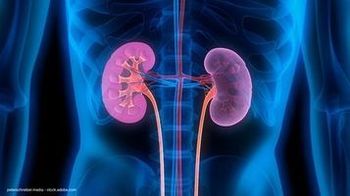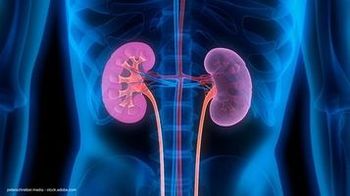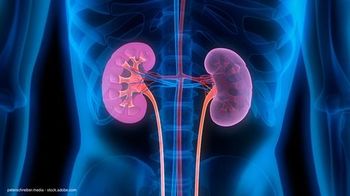
RANK ligand inhibitor increases bone metastasis-free survival
The RANK ligand inhibitor denosumab (XGEVA) appears to significantly increase bone metastasis-free survival for more than 4 months in men with castrate-resistant metastatic prostate cancer that has not yet spread to bone, results of a multicenter study indicate.
The RANK ligand inhibitor denosumab (XGEVA) appears to significantly increase bone metastasis-free survival for more than 4 months in men with castrate-resistant metastatic prostate cancer that has not yet spread to bone, results of a multicenter study indicate.
The trial included 1,432 men with hormone-refractory prostate cancer with rapidly rising PSA levels who had no bone metastases at baseline. Denosumab significantly improved median bone metastasis-free survival by 4.2 months, a risk reduction of 15% compared with placebo (29.5 vs. 25.2 months, respectively; hazard ratio [HR] 0.85; 95% CI: 0.73, 0.98; p=.028).
Denosumab also significantly delayed the time to first bone metastases by 3.7 months compared with placebo (HR 0.84; 95% CI: 0.71, 0.98; p=.032; risk reduction of 16%) and reduced the risk of bone metastases that were symptomatic by 33% (HR 0.67; 95% CI: 0.49, 0.92; p=.01).
Overall survival was similar between groups (HR 1.01; 95% CI: 0.85, 1.20; p=.91), and the hazard ratio for progression-free survival was 0.89 (95% CI: 0.78, 1.02, p=.093).
"In this landmark phase III study, denosumab increased bone metastasis-free survival by preventing bone metastases in men with castration-resistant prostate cancer," said co-investigator Matthew Smith, MD, PhD, of Massachusetts General Hospital Cancer Center, Boston. "XGEVA is the first and only bone-targeted therapy that has demonstrated the ability to significantly reduce the risk of bone metastasis in men with prostate cancer."
In the trial, adverse events and serious adverse events were relatively similar between the denosumab and placebo arms. Hypocalcemia and osteonecrosis of the jaw were reported with increased frequencies in the denosumab-treated patients. Back pain was the most common adverse event reported in the denosumab arm.
Newsletter
Stay current with the latest urology news and practice-changing insights — sign up now for the essential updates every urologist needs.





